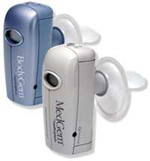Microlife BodyGem and MedGem Nutrition 101
The Microlife BodyGem and MedGem indirect calorimeters measure Resting Metabolic Rate, to help your clients reach their weight loss goals.
 Instead of estimating RMR with the Harris-Benedict or Katch-McArdle formula, the BodyGem and MedGem scientifically measure a clients VO2 to determine their Resting Metabolic Rate (RMR).
Instead of estimating RMR with the Harris-Benedict or Katch-McArdle formula, the BodyGem and MedGem scientifically measure a clients VO2 to determine their Resting Metabolic Rate (RMR).
Estimation formulas cannot factor in thyroid issues, the effects of medications, etc.
Nutrition 101: The basics for healthy eating
Food is the fuel our bodies use to perform daily activity. In simple terms, food is energy like gasoline for a vehicle. There are over 45 nutrients our bodies need for daily function. Some nutrients have energy (i.e., calories) and others do not, but both are important to basic physical function. A basic understanding of nutrition can help individuals achieve personal health, weight, and lifestyle goals.
Nutrients that have calories are called macronutrients. These include:
Carbohydrates are the body’s main source of energy. One gram of carbohydrates yields 4 calories. The U.S. Department of Agriculture recommends 50-55% of our daily calories come from Carbohydrates. Carbohydrates consist of starches, sugars, and fiber. Fiber. Dietary fiber should be consumed daily to improve movement in the gastrointestinal tract, help keep blood sugar levels moderate following eating, and to maintain healthy cholesterol levels. Fiber is found in plant foods.
Proteins are made of amino acids. Proteins are necessary for growth, maintenance and tissue (i.e., muscle) repair. Good sources of protein include lean meats (e.g., fish, chicken, etc.), legumes (e.g., beans, etc.), and dairy products. One gram of protein yields the same amount of calories as carbohydrates (i.e. 4 calories). The U.S. Department of Agriculture recommends 20-25% of our daily calories come from protein.
Fats supply energy, essential fatty acids, and are needed to absorb vitamins (e.g. vitamins A, D, and E). One gram of fat yields 9 calories and is twice the amount of calories per gram than carbohydrates and protein. The U.S. Department of Agriculture recommends less than 30% of our daily calories come from fat.
Saturated fats tend to increase cholesterol. These fats are found in high fat dairy products (e.g., cheese, cream, etc.), high-fat meats (e.g., sausage, beef, poultry skin, etc.), lard, and coconut oil.
Replacing foods high in saturated fats with foods high in unsaturated fats can help lower cholesterol. There are two types of unsaturated fats; monounsaturated fats and polyunsaturated fats. Monounsaturated fats are found in canola oil, olive oil, peanuts, and avocados. Polyunsaturated fats are found in all other vegetable oils, nuts, and high-fat fish (i.e. salmon, etc.).
Trans fats tend to raise blood cholesterol. The best method to identify trans fats is to look for “partially hydrogenated” oils in the ingredient list of the nutrition facts label. Trans fats are in many commercial backed products (e.g., cookies, crackers, etc.) commercially fried foods (e.g., chips, French fries, etc.), and some margarines.
Foods high in cholesterol tend to raise blood cholesterol. However, saturated fats may be more important in raising blood cholesterol. Dietary cholesterol comes from animal sources such as egg yolks, beef, poultry, fish, and high-fat dairy products. It is important to monitor cholesterol intake since it is directly related to heart disease.
Micronutrients & Water Foods that do not contain calories include micronutrients and water. Below is a brief description of the function of each component.
Vitamins do not provide energy because they do not contain calories. However, vitamins do help the body convert food into energy which is necessary for metabolism. Vitamins are abundant in vegetables and fruit. Vitamins can also be found in legumes, dairy products, eggs, and meat.
Minerals are important for metabolism and are involved in the composition of the structure of the body. Minerals do not provide energy but are necessary for the body to properly function. Examples of minerals include calcium, iron, magnesium, and potassium.
Water dissolves substances, lubricates joints, and provides a way to transport nutrients and waste.
Click on the links for more information on the Microlife BodyGem or MedGem indirect calorimeters
Contact me at 1-800-743-3328 to discuss Microlife BodyGem RMR System Kit pricing options.
Harvey Harris